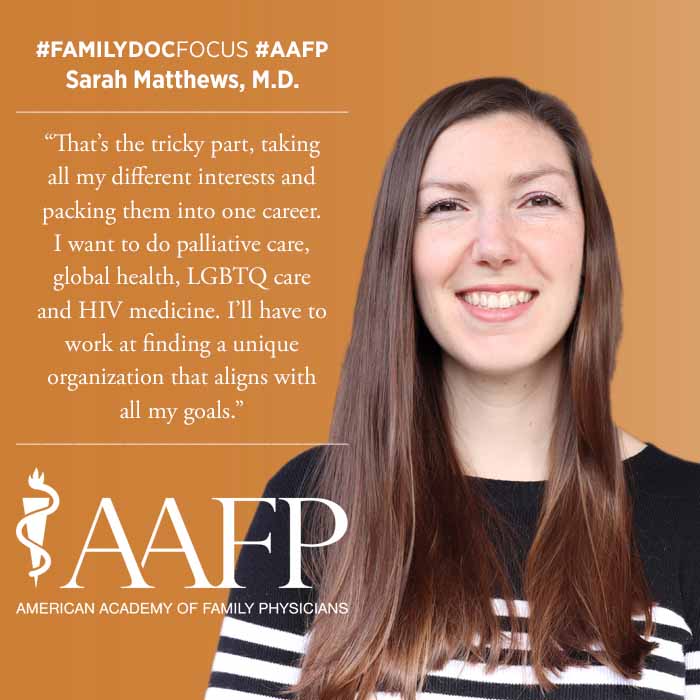Resident Is Laser-focused on Helping Others
February 11, 2019 09:16 am David Mitchell – Sarah Matthews, M.D., was fascinated by her undergraduate work with lasers in a University of Delaware physics lab, but she eventually realized it wasn't where she was meant to be.
"It was missing the human element and helping people, which was important to me," she said. "I had no idea what I wanted to do with my life."
Matthews figured it out, in part, by volunteering at a local hospital. As a candy striper, she connected with elderly patients in an acute care unit, listening to their stories about the Roaring '20s and World War II while making beds and performing other basic tasks. That experience put her on a premedical path and gave her an opportunity to help people who need it.
After Matthews completes her residency training at the Family Health Centers of San Diego in June, she'll stay in San Diego for a palliative care fellowship.
"Palliative care appeals to me because I like the philosophy of focusing on quality of life rather than quantity," she said. "It gives patients control over their care. Our health care system is not very good at helping people transition to the end of life."
Global health is another area of focus for Matthews, who volunteers with Survivors of Torture International, providing forensic evaluations for asylum seekers prior to their court cases. Matthews' passion for global health was sparked by another volunteer experience, working with a refugee health organization at Sidney Kimmel Medical College at Thomas Jefferson University in Philadelphia. The student-run group there not only operated a free refugee health clinic, but also helped refugees navigate their new city and advocated for translation services during their visits.
That experience led Matthews to spend a month on a rotation in remote villages in Nepal during her fourth year of medical school.
"There was no running water, no electricity and no roads for miles," she said. "The people had to walk through the mountains for hours to reach the clinic, sometimes carrying sick family members on their backs."
Matthews presented a poster about incorporating forensic documentation for asylum seekers into residency training at the AAFP's Global Health Summit last year in Jacksonville, Fla. Presenting at a national conference and completing a rotation abroad are two of the requirements for the global health curriculum that Matthews developed for her residency program. She'll check the latter off her list in April when she heads to southern Africa for an HIV medicine rotation in Lesotho. She completed an HIV training track as part of her residency at Family Health Centers and is now board-certified as an HIV specialist.
Matthews' trip to Jacksonville and her upcoming rotation were paid for, in part, through the AAFP Excellence in Graduate Medical Education (GME) Award that she received last fall during the Family Medicine Experience (FMX).
(The deadline to apply for the 2019 GME awards is April 5. Twelve family medicine residents will receive $1,000 scholarships and as well as transportation and lodging for two nights to receive the honor in person during the 2019 AAFP FMX, Sept. 24-28 in Philadelphia.)
Nearly a decade after her story started in that physics lab, Matthews now has a clear idea of what she wants to do with her life. Soon, she'll have to find her ideal place to do it.
"That's the tricky part, taking all my different interests and packing them into one career," she said. "I want to do palliative care, global health, LGBTQ care and HIV medicine. I'll have to work at finding a unique organization that aligns with all my goals."
